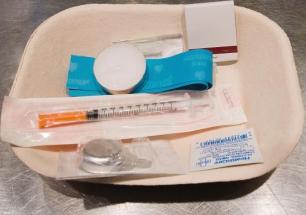Massachusetts is moving closer to opening a safe injection site for drug users
Summary/Abstract
Physicians in the Massachusetts Medical Society will vote at the end of this month on whether or not to advocate for a supervised injection facility pilot program in the Bay State. The vote comes in response to a recommendation from the organization’s board of trustees, which was unanimously approved in February.
Content
A supervised drug consumption facility is a legally-sanctioned room where drug users can ingest illegal substances under medical supervision. There are currently no such facilities in the United States, but two are expected to open in Seattle and King County in Washington.
If the medical society votes to approve the recommendation, it will become the first statewide physicians group to endorse supervised injection facilities, according to WBUR.
If the state were to pursue the pilot program, it’s likely that it would take place in Boston. Specifically, medical society members are eyeing Boston Health Care for the Homeless in the South End, which is home to the Supportive Place for Observation and Treatment (SPOT), which opened last year. In SPOT, patients are supervised by nurses while high, but they are not allowed to use drugs while in the SPOT room.
Supporters of supervised injection facilities say the sites would be a new tool for medical professionals to help save lives. Critics, however, question the ethics and legality of such facilities, arguing that they may encourage illegal drug use.
Other cities across the country are taking steps toward opening such facilities. Health officials in San Francisco have introduced legislation to convene a task force that would look into the feasibility of opening safe injection sites in certain neighborhoods in the city, and health and law enforcement professionals in Vermont are considering setting up a site in Burlington.
Supervised injection facilities provide sterile injection equipment, information about reducing the harms of drugs, health care, treatment referrals, and access to medical staff. Some offer counseling, hygienic amenities, and other services.
They are also successful in reducing public disorder associated with illicit drug use, including improper syringe disposal and public drug use.
SIFs have been researched and evaluated for years. The evidence is conclusive that they reduce HIV and hepatitis transmission risks, prevent overdose deaths, reduce public injections, reduce discarded syringes, and increase the number of people who enter drug treatment.
There are now actually approximately 100 SIFs operating in at least 66 cities around the world in nine countries (Switzerland, Germany, the Netherlands, Norway, Luxembourg, Spain, Denmark, Australia and Canada). The first North American supervised injection site, Insite, opened in Vancouver, Canada in 2003.






